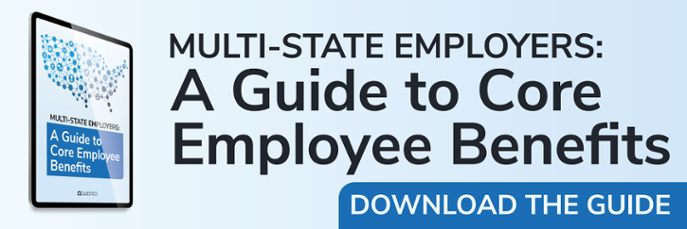
Managing HR compliance as a multi-state employer can be overwhelming due to varying state regulations, tax laws, employee rights, and reporting requirements that must be consistently monitored and followed.
Businesses can simplify compliance and reduce risks by understanding the core challenges and leveraging expert solutions like PEOs. Below, we’ll break down the key areas of multi-state HR compliance, including pre-hiring regulations, wage laws, training requirements, and practical ways to stay aligned.
What Is Multi-State HR Compliance?
Multi-state HR compliance refers to the process of adhering to federal, state, and local employment laws when managing employees across different states. Each state—and sometimes cities—has unique laws governing hiring, wages, benefits, and worker protections. Failure to comply can lead to hefty fines, penalties, and legal actions. For small HR teams, managing these varied requirements can be a logistical challenge.
Why Is It Complicated for Multi-State Employers?
When you hire employees across state lines, you must juggle differing rules related to everything from application forms to paid leave policies. Even issues like record keeping or overtime calculations can vary based on location. These differences are particularly burdensome for businesses expanding into new territories without a compliance expert.
Key Takeaway: Multi-state compliance requires continuous monitoring of legal updates, making it essential for businesses to have a structured approach—or a trusted partner, like a PEO—to manage the complexities.
Pre-Hiring Compliance
What are the requirements for hiring in multiple states?
Pre-hiring compliance involves meeting the federal and state requirements for screening, documenting, and onboarding employees. These rules begin as early as the application form and extend through the hiring process.
Application Forms and Background Checks
Some states enforce specific rules about the information employers can request upfront.
For example:
- Ban-the-Box laws prevent employers from asking about applicants' criminal records on job application forms. Currently, 15 states and Washington, D.C., have these rules.
- Service Letter Laws in certain states require employers to provide letters detailing job history and reasons for termination when employees leave.
Federal Documentation Standards
Under the Fair Labor Standards Act (FLSA), companies must retain certain employee records for defined periods. Additionally, federal law mandates that new hires and rehires be reported within 20 days. However, multi-state employers can consolidate reporting by registering with the Department of Health and Human Services (HHS).
Pro Tip: Conduct regular audits of your hiring process to ensure your application materials, offers, and onboarding steps comply with federal and state laws.
Wage and Hour Compliance
How do minimum wage and overtime rules vary by state?
Compliance with wage and hour laws can be tricky, especially as federal, state, and sometimes city regulations all come into play.
Minimum Wage Laws
Federal law sets the minimum wage at $7.25 per hour, but many states have higher wage mandates. For example:
- California has a $15/hour minimum rate for businesses with 26+ employees.
- Some states, such as Oregon, assign minimum wage rates based on county or city, adding another layer of complexity.
Overtime and Break Requirements
Federal overtime laws mandate time-and-a-half pay for non-exempt employees who work over 40 hours in a given week. However, state laws may differ:
- California: Employee overtime activates after 8 hours of work daily. Overtime rates double after 12 hours.
- Oregon Manufacturing Rules: Overtime applies when a workday exceeds 10 hours.
Federal law doesn’t require specific meal or rest periods for breaks. But if they are offered, employers must ensure they comply with FLSA rules if they are 30 minutes or longer. States like California and Washington often go beyond these federal protections, providing greater safeguards for employee breaks.
Actionable Step: Ensure your HR or payroll systems are updated to accommodate state-specific wage, overtime, and break calculations.
Paid Leave and Mandatory Training
Paid Sick Leave
Federal law doesn’t require paid sick leave, but several states and cities now mandate it. Employers must understand:
- Accrual rates and caps for sick leave.
- Qualifying reasons for using leave, which may include domestic abuse, stalking, or caregiving.
- Additional permissions, like California’s rule, allow employees to use leave for family or employer-required school activities.
Mandatory Training
Employers in some states must provide specific types of training, such as sexual harassment prevention or nondiscrimination courses. For instance:
- California requires training for employees and supervisors on workplace harassment prevention.
- New York and Connecticut have similar mandates, ensuring workforce education.
Employers across multiple states must implement customized training programs to meet diverse legal expectations.
Pay Equity and Anti-Discrimination Laws
Pay Equity
Under the federal Equal Pay Act, businesses must ensure equal pay for equal work. States like Massachusetts, Oregon, and New York expand this to cover comparable or substantially similar roles even when job titles differ.
To avoid violations:
- Build clear job descriptions highlighting expected qualifications.
- Avoid using salary history in hiring decisions, as many states prohibit this practice.
Anti-Discrimination Protections
Federal law prohibits workplace discrimination based on age, disability, gender, and other characteristics. Some states extend these protections:
- California includes broader categories like gender expression and marital status.
- Smaller firms are also subject to employment laws in some states, even if federal laws typically apply only to businesses with over 15 employees.
Pro Tip: Standardize equitable hiring and pay practices company-wide, even if some jurisdictions don’t require them—it fosters fairness and prevents inconsistencies.
Navigating Workers’ Compensation
While workers' compensation laws exist nationwide (except Texas), each state manages its requirements. States like Washington and Wyoming require businesses to register with state-specific funds, while others permit private insurance carriers.
Multi-state employers should:
- Review each state’s industry and payroll thresholds.
- Streamline workers’ compensation claims processes for improved employee experience.
How Can a PEO Help Manage Multi-State Compliance?
A PEO, or Professional Employer Organization, simplifies the complexities of multi-state compliance. By partnering with a PEO, businesses gain a co-employment arrangement, transferring HR burdens to specialists to ensure regulatory compliance in all hired states.
Services Offered by a PEO Include:
- Multi-State Payroll: Effortless adherence to varied tax codes, overtime laws, and deductions.
- Benefits Management: Access to national health plans and uniform offerings despite differing state regulations.
- Employment Law Updates: Proactive tracking of regulatory changes.
- Expert Guidance: Immediate access to HR professionals who understand state-specific rules.
Using a PEO prevents compliance gaps while saving time and reducing costs in benefits and workers’ compensation rates.
Simplify Multi-State Compliance Today
Managing HR compliance across multiple states doesn’t have to overwhelm your team. Instead of tackling it alone, rely on a PEO to support your operations. From payroll to training, a PEO can handle the complexities, so you have more time to focus on what matters most—your business growth.




